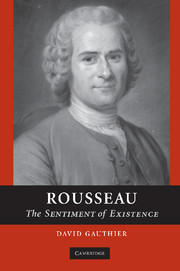4 - In Julie's Garden
Published online by Cambridge University Press: 29 March 2010
Summary
“I must flee you, Mademoiselle.” (CW6.25, OC2.31) Thus Julie's tutor begins his first letter to his pupil of a year. The words are a declaration of love. In the more than seven hundred pages that follow, we read the “Letters of Two Lovers Who Live in a Small Town at the Foot of the Alps” (CW6.1, OC2.3) – and the letters of those caught up in their story. For many of us Rousseau is the author of the Social Contract, the Discourse on the Origin of Inequality, the Confessions, perhaps Emile. But in his lifetime, and for some years thereafter, by far the most widely read of his books was his novel, Julie, subtitled The New Eloise (La nouvelle Héloïse). The subtitle may mislead; the lovers are indeed tutor and pupil, but their circumstances, and their fates, differ markedly from those of Eloïse and Abelard. The novel, despite its length, tells a simple, unconvoluted story, which I shall recount after briefly placing Julie in my overall reading of Rousseau. It was published shortly before Emile and the Social Contract. All three reflect the illumination on the road to Vincennes, and the Fall portrayed in the Discourses. But it was conceived rather later than these other works and moves beyond them in two important respects. Julie contains its own redemptive vision, but it also contains its own deconstruction of that vision, not leaving the task to be performed implicitly and elsewhere.
- Type
- Chapter
- Information
- RousseauThe Sentiment of Existence, pp. 79 - 106Publisher: Cambridge University PressPrint publication year: 2006



